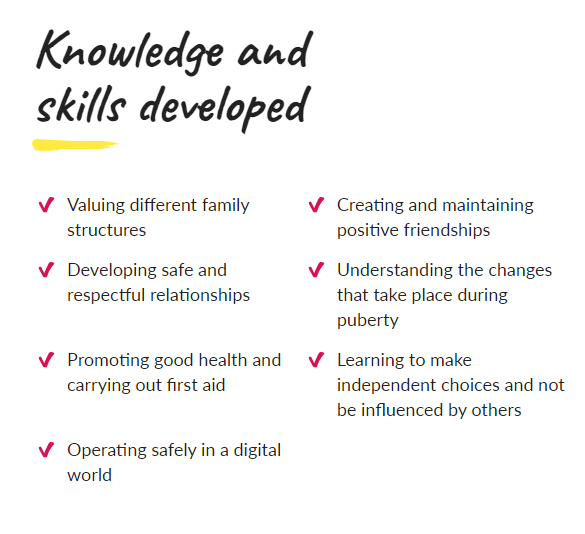RSHE & PSHE
Sex and Relationships Education (SRE)
Relationships and sex education might be a difficult subject to handle, but it’s an essential area of learning for your child. The main aim of Relationships, Health and Sex Education is to keep children safe.
Today’s children and young people are growing up in an increasingly complex world and living their lives seamlessly on and offline… children and young people need to know how to be safe and healthy, and how to manage their academic, personal and social lives in a positive way’
DfE Guidance on Relationships Education, Sex Education and Health Education 2019
At Veritas, we are always respectful of the beliefs, faiths and contexts of the children’s families and welcome parental and carer engagement on the topic of RSHE.
What can you expect your child to learn and when?
From September 2020 all state primary schools in England are required to teach children about relationships and health education. By the end of their time at primary school, children should be taught about the following content (DfE 2019):
|
Relationships Education
|
Health Education
|
*In relationships education we use the terms ‘two mums’ or ‘two dads’ to describe same gender families, we don’t introduce the terms gay, lesbian etc.
** Puberty has been introduced from year 3 as National Data has revealed that more children are entering puberty from the age of 7 and 8.
As these are statutory requirements set out by the DfE about what children must learn by the end of primary school, parents DO NOT have the right to withdraw children from these lessons.
Sex Education
Sex education is taught at the school’s discretion, at the primary age, sex education is:
- Human reproduction
- Conception and birth
However, under the National Curriculum, which is statutory, sex education falls within the science curriculum. The statutory content requires maintained schools to teach children about human development, including puberty, and reproduction.
- In Key Stage 1, children learn to identify, name, draw and label the basic parts of the human body and say which part of the body is associated with each sense. They learn to notice that animals, including humans, have offspring which grow into adults. They should be introduced to the concepts of reproduction and growth, but not how reproduction occurs.
- In Key Stage 2, children are taught about the life cycles of humans and animals, including reproduction. They also learn about the changes that happen in humans from birth to old age. This includes learning what happens in puberty.
If sex education is taught within PSHE lessons (which it is at Veritas), parents DO have the right to withdraw children from the lessons. If you do wish to withdraw your child, please inform Mrs Conneely.
What approach does Veritas use?
Veritas has chosen to use the KAPOW to deliver high quality PSHE and RSHE to your children. The scheme also has a strong focus on emotional and mental health and wellbeing.

All class teachers will teach RSHE and feel confident to teach this subject.
There is a whole-school approach from Nursery to Year 6. All RSHE lessons will be developmentally appropriate, taking into account the levels of maturity of individual children as well as the whole class. Teachers will answer children’s direct questions in an open and factual way and staff will not enter into discussions about personal issues and lifestyles. In Key Stage Two, a male and female member of staff will be present in lessons to address any questions the children may have.
More Information
At Veritas, we encourage our parents to discuss with us what is taught within our curriculum. Our curriculum maps provide an opportunity for you to see what is being taught within the upcoming term for your child.
If you would like to view the resources used in our PSHE/RSHE lessons, your child’s teacher or Miss Kimpton would be more than happy to show and discuss them with you.
